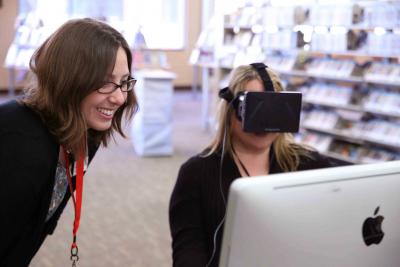Multiliteracies and the Teacher-Librarian
As I was reading the New London Group paper, “A Pedagogy of Multiliteracies: Designing Social Futures” (1996), I was thinking about the role of Teacher-Librarians. Recently I changed from my position asTeacher-Librarian to Technology Helping Teacher within my school district. There were many factors that influenced my decision to change positions, but one reason was apparent above all others, the position was 0.4 FTE. It was very difficult to be an effective school librarian 2 days a week. Although teacher-librarian positions suffer increasing cutbacks I argue that the librarian’s role is one of the most important in the building, especially when we consider the shift in educational pedagogy addressing multiliteracies. The New London Group (1996) argue that literacy pedagogy needs to include a broader moral and cultural order. New communication media is reshaping the way we use language and we need to focus on the realities of increasing diversity and global connectedness. The group also mentions that the educational system is in need of mentors who are capable of playing multiple and different roles, to guide teachers and learners and to form extra school communities. I believe this mentor role is ideal for the teacher librarian.
What students need to learn is changing. With the increasing invasion of mass media culture and information networks, educational practices in literacy need to focus more on social outcomes. Cultural and linguistic diversity are now critical issues. Students need to understand multiliteracies and develop skills to help them in their future work lives to develop the capacity to speak up, to negotiate and to be able to engage critically with the conditions of working life (New London Group, 1996). Literacy educators need to act as active participants in this social change, and in order to for this shift to happen, educators must have access to resources and the leadership to help them be successful. Again supporting the critical role of a teacher-librarian.
In most schools I have worked in, if you had a question about where to find resources or needed support with technology, you were directed to the school librarian. They are experts in resources whether it is text, audio, visual, technology based or what the New London Group refer to as multimodal. They are natural mentors who are capable of playing multiple and different roles. Libraries are central to the educational workplace. The role of text and meaning of literacy may be changing as technology introduces new communication media, and I believe the role of the librarian needs to change with it. Librarians need to become experts in media literacy and be a part of the active and dynamic process of teaching multiliteracies. Librarians are designers of learning processes and environments. An increasingly important position, not to be overlooked in the process of educational change.
The New London Group. (1996) “A Pedagogy of Multiliteracies: Designing Social Futures.” Harvard Educational Review 66(1), pp. 60-92.
Arapahoe Library. (2013, May). Oculus Rift [Digital Image]. Retrieved from http://arapahoelibraries.org/sites/default/files/studiox.jpg.


I think that you have made a good point about the role of the teacher-librarian. Librarians have always played a critical role in helping students, and their teachers, access information. However, the way students are accessing information is different and I agree the role of librarian is also changing. Instead of learning how to access a card catalogue, students now need to learn about search filters and Boolean Operators. The school library is a great place to learn about some of the research techniques and information about the changing nature of information. I remember in grade 9, the librarian came to our class to talk about research methods and then introduce us to the format of the library. A similar program would be beneficial, but with more updated search techniques.
I think it would also be useful to have the librarian because they would be able to keep abreast of the changing technology and different websites/applications that are useful for students. A subject teacher might know about a site that is good for their subject, but they probably won’t know about sites for other subjects. There is so much information available to students, it would be good for them to have a resource to help guide them through to make the best use of their time. I think the point about mentors playing multiple roles is a good one. A librarian is in a unique position in a school and would be well placed to fit the mentorship role. They are also in a good position to provide information about the various modes of information and how to best access them.
Catherine
Hi Corinne,
Firstly, I found it interesting how you termed it an “invasion of mass media culture and information networks”. I guess sometimes it can feel like that and I find society is quite willing to take up new technology, and operate in a fairly regulation free environment without any qualms about the consequences of this.
Secondly, though I wholeheartedly support the teacher-librarian role, I think all teachers (among others) need to be able to support students and teach multiliteracies. If “teachers and managers are seen as designers of learning processes and environments” (The New London Group, 1996) they need to be well versed in learning technologies and their application. Leaving this task to teacher-librarians alone is ludicrous. The New London Group advocates for overt instruction and situated practice for learning; teachers are an integral part of this process. And it is not just teaching learners how to use technology, it is helping learners to understand the why, when, and where of its use.
It appears that the role of the teacher-librarian needs to shift from one of just supporting students to one of supporting other teachers by keeping them abreast of changes in technology and providing in-services to teach teachers about technology, thus ensuring teachers have the requisite knowledge to support students.